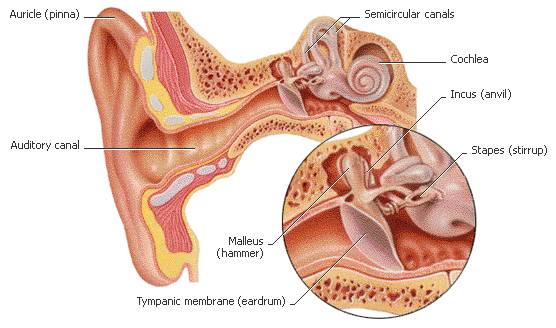Overview
The Ear is the organ that detects sound. The vertebrate ear shows a common biology from fish to humans, with variations in structure according to order and species. It not only acts as a receiver for sound, but also plays a major role in the sense of balance and body position. The ear is part of the auditory system.
The word "ear" may be used correctly to describe the entire organ or just the visible portion. In most animals, the visible ear is a flap of tissue that is also called the pinna and is the first of many steps in hearing. In people, the pinna is often called the auricle. Vertebrates have a pair of ears, placed symmetrically on opposite sides of the face. This arrangement aids in the ability to localize sound sources.

What is Acute Otitis Media ?
Acute otitis media is the medical term for the common ear infection. Otitis refers to an ear infection and media means middle. So, acute otitis media is an infection of the middle ear, which is located behind the eardrum.
There is a tube, called the Eustachian tube, that connects the middle ear to the nose. This tube helps drain extra fluid from the middle ear. When a child has a cold, swelling in the nose may impede drainage. Germs (either viruses or bacteria) can enter the middle ear and cause an infection. The infection results in increased fluid in the ear and can cause pain, fever and irritability.
How is an Ear Infection Treated?
Until recently, all children with ear infections were given antibiotics. New research suggests that many children with ear infections will get better without antibiotics, and with no ill effects. This is called the observation option.This option reduces the use of unnecessary antibiotics, and limits the childs exposure to the side effects of antibiotics. It also reduces the chance that super bacteria bacteria that cannot be killed by antibiotics will develop.
Your childs health caregiver may offer this option if your child is over age 2, does not have pus draining from the ear, has not had an ear infection in more than three months, is otherwise healthy, and will have medical follow-up within 48 hours. If your health caregiver does not discuss it, you may want to ask if this is an option for your child.
A child who is seen in an emergency room or urgent care center may be given an antibiotic if the health caregiver is concerned that the child will not see his or her own health caregiver within 48 hours. It is important that you allow the caregiver to decide if the observation option will be used. If, on the other hand, antibiotics are needed, you should trust him or her to select the proper medication and course of treatment. A parent should not insist on choosing the antibiotic.
If an antibiotic is prescribed, it will likely be AMOXICILLIN, unless the child is allergic to penicillin. Depending on the situation, the provider may decide that the child should take the antibiotic for five days instead of the usual 10 days. This should be the decision of the health caregiver. If the treatment doesn�t work, more antibiotics may be needed.
Of course, differences in children, and the severity of the illness, may change these choices.
Remember, a single dose of an antibiotic will not make the ear infection feel better! In fact, the antibiotic will not relieve the symptoms. Ear pain from an infection should be treated with a non-aspirin pain reliever.
Ear Conditions :
 Acoustic Neuroma
Acoustic Neuroma
 Dizziness and Vertigo
Dizziness and Vertigo
 Ear Disorders
Ear Disorders
 Ear Infections
Ear Infections
 Hearing Disorders and Deafness
Hearing Disorders and Deafness
 Hearing Problems in Children
Hearing Problems in Children
 Meniere's Disease
Meniere's Disease
 Noise
Noise
 Tinnitus
Tinnitus
For more information, medical assessment and medical quote
as email attachment to
Email : - info@wecareindia.com
Contact Center Tel. (+91) 9029304141 (10 am. To 8 pm. IST)
(Only for international patients seeking treatment in India)










